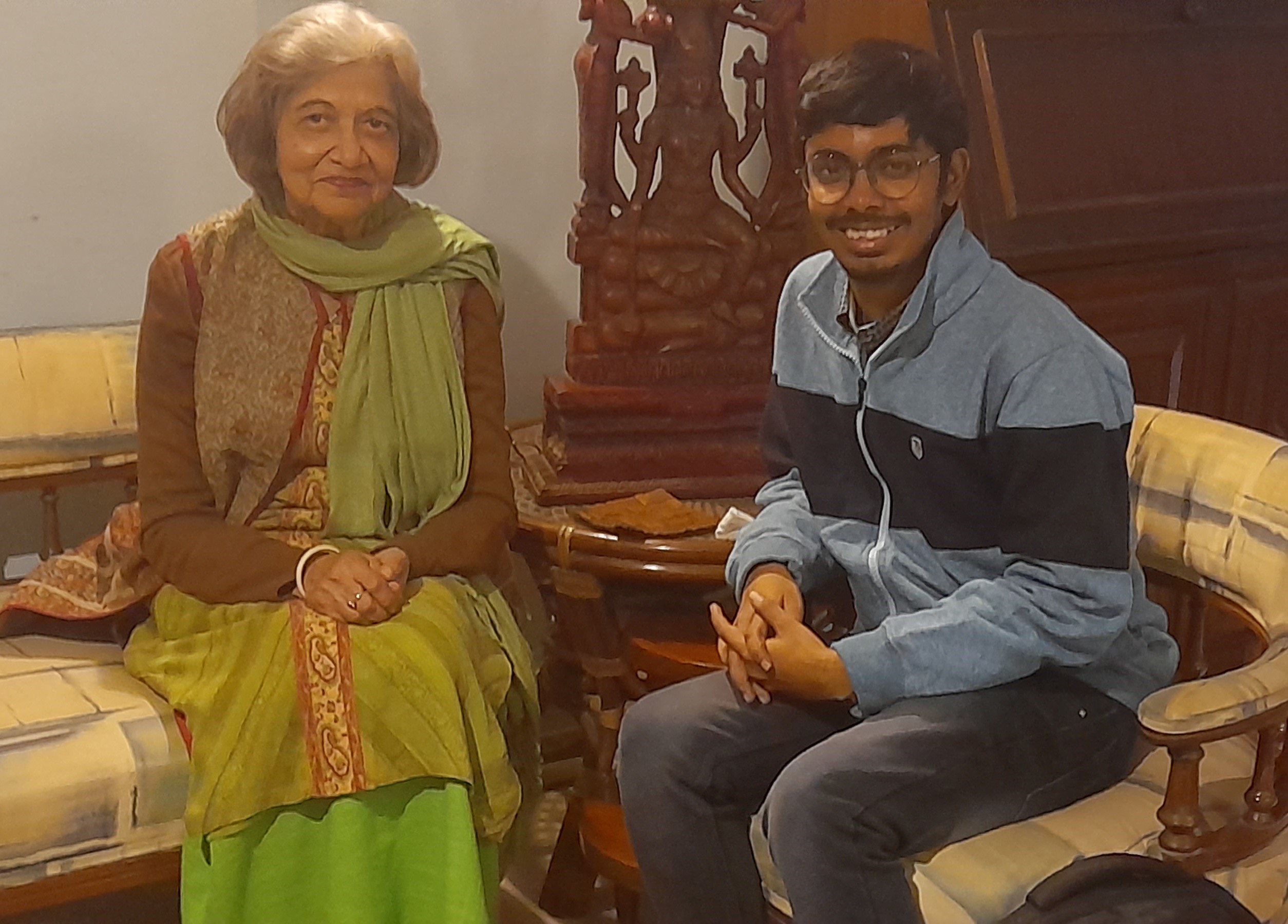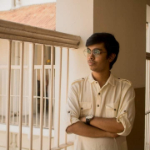INTERVIEWED BY OWSHNIK GHOSH
Mridula Garg is a well-known Hindi writer. She had written short stories, novels, plays, travelogues, essays, poems and columns. Besides Hindi, she also writes in English. She won the Sahitya Akademi Award in the year 2013. The Antonym’s Owshnik Ghosh interviewed the senior, prolific writer on her world, work and passion.
OG: How were you introduced to the world of words as a child?
MG: Everyone in my family, father, mother, sister, uncles et al were avid readers of literature in Hindi and English. So not only was I introduced to the world of words in both languages; the only world I knew intimately was the world of words. There were windows opening into the worlds of many languages through translation into Hindi and English. Languages like Bangla and Malayalam in India and French and Russian among foreign languages. It happened as naturally as breathing and eating.
OG: How did your first novel Uskie Hisse ki dhoop come into being?
MG: Every novel comes into being out of the varied experiences of life lived at many diverse levels. I can’t say, what was the exact experience. I could not then, certainly can’t now after 50 years of writing it.
OG: At a point of time, you also wrote poetry, why did you leave writing poems?
MG: I seldom wrote poetry and when I did the poems were largely love poems written to or for a particular person. I guess I stopped writing when the passion got spent. Some other poems were written in particular moments of grief. So naturally, they were sporadic and very personal. I went back to writing poetry only during the time of Covid 19. I wrote about 20 poems; then went back to writing my major book, A Memoir of my Time, which had been interrupted by the onslaught of COVID-19 on the family, friends, and the country in general.
OG: Why do you prefer not to be called a feminist writer?
MG: Being a feminist is totally different from being a feminist writer. I don’t think literature can be written under brand names. I have never written under compulsion of an ism, social, political, or literary theory or cult borrowed from others or preached by them. I am a Feminist in real life, which means I believe women are free individuals fully capable of thinking for themselves and not influenced by men or prevailing fashion of thought. But I am not a Feminist writer. In the same way, I am a Marxist in life but not a Marxist Writer. I don’t allow my writing to be bound by any theory, be it feminist, Marxist, Vedic, Religious, or any other brand of thought process. In any case, writing about women has nothing to do with being a feminist. A misogynist can write about women, in fact, they have always done so. I write about men, women, and children; the earth and the environment as I perceive them in reality and imagination, and most important reflection. Experience can come through many sources once it jells in my memory, it becomes a fertile ground for all kinds of creative seeds to sprout. Basically, the greatest disservice we can do to literature is to compartmentalize writers as feminist, Dalit, indigenous, etc. It is childish and anti-literature as it tries to restrict free thought and expression which is the lifeblood of literature.
OG: Besides writing short stories and novels, you have also written plays. How was your experience venturing into a performative form?
MG: Plays need other people for being performed and these other people or performers, directors, and producers want more action than reflection in Plays, at least in Hindi. I am not a very good team person. And my plays, like my novels, proceed on the cerebral and emotional level and have comparatively little action. So, they did not get performed much, and gradually I gave up writing plays in favour of novels and stories. In any case, the few plays I wrote were because there was a crying need for that particular genre and craft to express a particular fervent theme.
OG: What are your views on freedom of expression in art and its relation to the society and state?
MG: There’s no Art or Literature without freedom of expression. The reason people write, paint, sing, play an instrument, dance, sculpt or make films is in order to express themselves in ways that the mundane society and pragmatic behaviour are afraid to indulge in. Or have never thought out of the box to create an alternate reality. The State is an outside force which intrudes on Society to garner undue powers for itself or make laws and rules for the citizens in the name of maintaining law and order and preventing violence. In other words, we forgo part of our freedom as protection fee and allow the State to play at being the police and the army.
OG: You translated some of your literary pieces. How was your experience translating your own work?
MG: Translation of one’s own literary pieces requires a tight disciplined mind along with a singular passion: a passion which can rise above the familiarity and disregard the personal closeness to the text. It is obligatory for any translator to rise above one’s ego and consider the text superior to one’s own creative endeavours. When the text is a sample of that creativity itself, it acts as a double bind. Without being overwhelmed by it one has to recreate it in a way that its original literary worth is not only left intact but enhanced in the translated language. It was both a liberating experience and one that challenged my creative acumen to the fullest. I can say it was an exhilarating experience. But it happened only when there was an entrancing urge to give voice to a sensibility already expressed before.
OG: Besides writing in Hindi, you wrote a novel in English too. Why did you make a shift in your language? And how does it feel for a writer writing in two languages?
MG: I have done discursive writing in English and also written poems in English from day one. So, there was no question of a shift in language. We Indians are bilingual due to our colonial history. I am equally comfortable in Hindi and English except that considering the fact that I live and think in a prominently Hindi-speaking milieu except for the educated new generation which largely speaks bad English and worse Hindi, writing fiction came more naturally in Hindi. This particular novel, The Last Email got written in English because, firstly, the novel is a collection of emails that we usually write in English, in any case, of the two correspondents in it, one is British and the other Indian. So, both know English but only one of them knows Hindi. So, his emails would have been in the spirit of translations had the novel been written in Hindi. It came to me in English so I wrote it in that language.
As for writing in two languages, I don’t see why it should create any problem. I enjoyed the experience thoroughly. Maybe I will write another book in English in the near future, can’t say when exactly though.
OG: Why do you choose to write columns? Do you think that in fiction it is not always possible to express certain issues directly?
MG: I have written in many genres. Column writing was one of them. I did not want to write my columns as fiction so chose to write them as satire. Fiction can express anything. But that’s no reason for not delving into other genres.
OG: You have represented Hindi literature abroad. What response did you get from the readers outside the country?
MG: The response was good. But I was not abroad for a long enough time to count on that. The response was best in Germany and Russia. US was not great for response to literature but it was alright. Had I stayed there longer, I might have written a bit more in English. I can’t really say. It’s all conjecture.
OG: You have seen the shifts in Hindi literature for decades. What significant changes do you find in today’s writings from the time you started?
MG: I have been on the Hindi scene for 50 years. Unfortunately, from the beginning the Hindi literary Establishment favoured ideology-based literature, meaning realistic or what it called Marxist literature which it believed was pro-people. It led to some good realistic novels and stories like Premchand’s oeuvre being written. The other holy cow was works written in dialect. Phanishwar Nath Renu had a mastery over it. But others tended to copy Premchand or Renu without showing any originality. Others were barely tolerated unless they became superheroes like Agyeya or a rung below, Jainendra. Nirmal Verma was praised for his language and craft but was also expected to toe the Marxist dream to be worthy of the notice of the approbation of the critics. He walked the tight rope well and paid lip service to Marxism or social good etc. The disastrous outcome for literature was that hypocrisy was glorified and telling one’s own truth as opposed to the propagandist truth was ignored or laughed at. Gradually compartmentalization has touched ludicrous heights. Writing about women is feminist, about transgender protagonists is gender discourse, about Dalits is Dalit discourse, about village folk is socially conscious writing; about indigenous people is Adivasi discourse, and so on. Creative writing has been reduced to a superficial kind of discourse. What’s deemed as crucial or praiseworthy is not what you write but about whom you write. If you take a character from the upper class, you are deemed to support the rich and, hence are rightist, no matter what the theme is or the light in which you portray the wealthy character. It’s like an epidemic of trivia that has pushed writing within extremely narrow confines.
Of course, a few independent-minded writers continue to write meaningful books but they are few and far between. In any case, whatever is written is immediately labelled. One could write on different themes with varied crafts and reflect upon life in its manifold manifestations, you would still be labelled. If you are a woman, you are a good or bad feminist, if you are a transgender you are expected to write on transgender lives. I am afraid it will very soon reach a point where if you don’t write about a transgender, you are not a modern writer! Our attitude has reduced literature to propaganda of a poor kind. I won’t be surprised if soon it kills all literature and reduces it to fiction written according to the demands of the times. The hilarious part is that we continue to rile at post-modern as something anti-national. In any case, it is against the glorified Indian tradition. We conveniently forget that Mahabharata is a perfect example of post-modern writing. God forbid, I won’t be surprised if even this statement is considered an anti-glorifying tradition and not another feather in the cap of Mahabharata!
Also, Read A Conversation with Vaidehi, Interviewed by Owshnik Ghosh and published in The Antonym:
Follow The Antonym’s Facebook page and Instagram account for more content and interesting updates.



























Very insightful interview taken by Owshnik Ghosh of my work and reflections. Thank uou Owshnik.